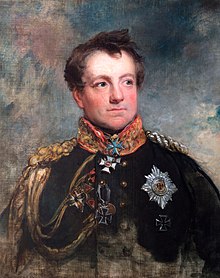August von Gneisenau
| August Graf Neidhardt von Gneisenau | |
|---|---|

Gneisenau by George Dawe, 1818
|
|
| Born |
27 October 1760 Schildau, Saxony |
| Died | 23 August 1831 (aged 70) Posen, Prussia (now Poland) |
| Allegiance |
|
| Years of service | 1779-1831 |
| Rank | Generalfeldmarschall |
| Commands held | VIII Prussian Corps |
| Battles/wars |
American Revolutionary War Napoleonic Wars *Battle of Ligny *Battle of Waterloo |
| Awards | Pour le Merite |
August Wilhelm Antonius Graf Neidhardt von Gneisenau (27 October 1760 – 23 August 1831) was a Prussian field marshal. He was a prominent figure in the reform of the Prussian military and the War of Liberation.
Gneisenau was born at Schildau in the Electorate of Saxony. He was the son of a Saxon lieutenant of artillery, August William Neidhardt, and his wife Maria Eva Neidhardt, née Müller. He grew up in great poverty at Schildau, and subsequently at Würzburg and Erfurt. In 1777 he entered the University of Erfurt, but two years later joined an Austrian regiment quartered there. In 1782, taking the additional name of Gneisenau from some lost estates of his family in Austria, he entered as an officer the service of the Margrave of Bayreuth-Ansbach. With one of that prince's mercenary regiments in British pay, he saw active service and gained valuable experience in the American Revolutionary War. Returning in 1786, he applied for Prussian service, and King Frederick the Great gave him a commission as first lieutenant in the infantry.
Made Stabskapitän (Staff Captain) in 1790, Gneisenau served in Poland from 1793-1794. Ten years of subsequent quiet garrison life in Jauer enabled him to undertake wide ranging studies of military and political history. In 1796 he married Caroline von Kottwitz.
In 1806 Gneisenau served as one of Prince Hohenlohe's staff-officers, fought at Saalfeld (10 October 1806) and Jena (14 October 1806), and a little later commanded a provisional infantry brigade which fought under in the Lithuanian campaign. Early in 1807, the Prussian Army sent Major von Gneisenau as commandant to Kolberg, which, though small and ill-protected, with the additional assistance of Schill and Nettelbeck succeeded in holding out against Napoleonic forces until the Peace of Tilsit of July 1807. The commandant received the highly prized Pour le Mérite and promotion to lieutenant-colonel.
...
Wikipedia
